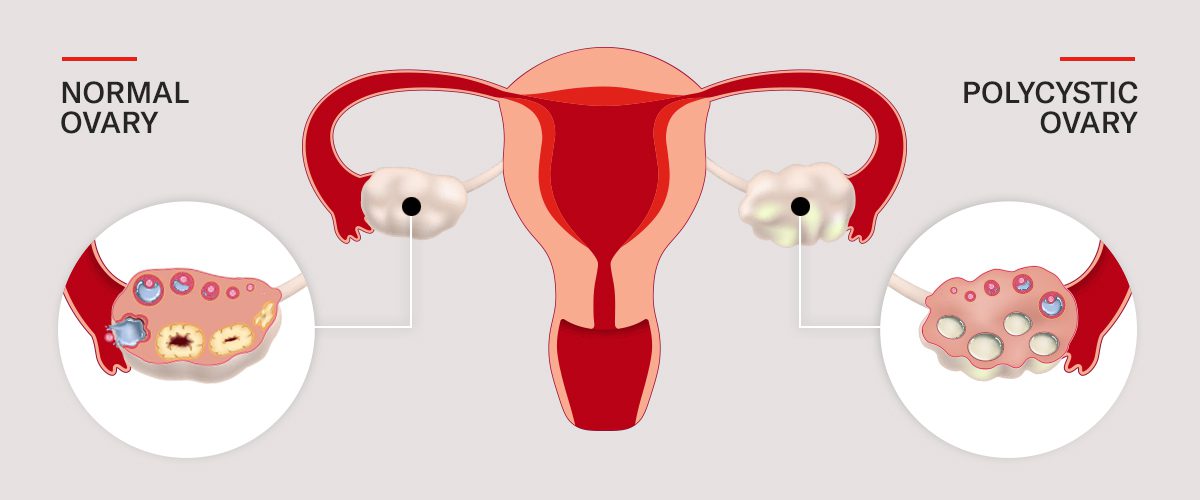What is Polycystic Ovary Syndrome (PCOS)?
A reproductive endocrinologist explains the common condition — its signs and symptoms, how it is diagnosed, and treatment options.


Polycystic ovary syndrome (PCOS) affects as many as 1 in 10 women of reproductive age, with diagnosis often occurring between the ages of 16 and 35. While the exact cause of PCOS is not fully known, it is very common. PCOS can affect a person’s periods, physical appearance, weight, and fertility. The good news is that treatment and lifestyle changes can improve symptoms and your quality of life.
“Whether a person wishes to get pregnant or not, there is treatment available and ways to improve PCOS,” says Dr. Hey-Joo Kang, a reproductive endocrinologist at the Ronald O. Perelman and Claudia Cohen Center for Reproductive Medicine at Weill Cornell Medicine and NewYork-Presbyterian/Weill Cornell Medical Center. “There are many more treatment options as opposed to 20 years ago. Whatever is bothering you about PCOS, it is treatable.”
Health Matters spoke with Dr. Kang about what is polycystic ovary syndrome, how it’s treated, and whether PCOS can be cured.

Dr. Hey-Joo Kang
What is PCOS, and what are its signs and symptoms?
Polycystic ovary syndrome is an endocrine disorder linked to irregular menstrual cycles, elevated levels of androgen (often called male hormones), and problems metabolizing glucose. The syndrome gets its name from the presence of small “cysts” found on the ovaries. The cysts contain immature eggs and populate the outer edge of one or both ovaries. However, the term “polycystic” can be misleading, as not all people with PCOS develop cysts. Symptoms can vary from person to person and can include:
- Irregular or missed periods and irregular ovulation (when the ovaries release an egg). This can lead to difficulty getting pregnant.
- Weight gain: “A lot of people with PCOS have trouble losing weight because of the inefficient glucose metabolism,” says Dr. Kang. “They may feel like they have to work harder than their peers for the same weight loss effect.”
- Excess hair in places like the face, chest, back and stomach; and acne. These symptoms are caused by elevated levels of androgens.
How is PCOS diagnosed?
There is no single test that can diagnose PCOS. Instead, healthcare professionals rely on a combination of medical history, physical exam, blood tests, and ultrasound imaging of the ovaries to make a diagnosis.
The Rotterdam criteria is a commonly used diagnostic tool for PCOS. It requires the presence of two out of three key features: irregular menstrual cycles, signs of high levels of androgens in the body, and polycystic ovaries as observed through a pelvic ultrasound.
Because PCOS symptoms can be caused by other conditions, diagnosing PCOS can be challenging. “There are other disorders that can masquerade like PCOS,” says Dr. Kang.
How is PCOS treated?
Treatment depends on each patient’s goal, says Dr. Kang. The first step is education.
“We want to teach them what the diagnosis means and what it doesn’t mean,” says Dr. Kang. “The next step is understanding their goals. Is [the patient’s] goal to achieve a pregnancy, or is the goal to control symptoms — such as acne, unwanted hair growth, or weight gain? Is it to try and regulate their periods? Our job is to meet those goals and make sure they achieve them in the most efficient way possible.”
Common Treatments
To treat weight gain and obesity, the first approach is diet and exercise. If weight loss doesn’t occur through a healthy diet and regular physical activity alone, metformin, a diabetes drug that helps the body use insulin better, can also be used as a treatment, says Dr. Kang.
To treat unwanted hair growth and acne, an anti-androgen drug called spironolactone works quite well. But Dr. Kang adds that you should not conceive on this drug. Some people also choose cosmetic procedures like laser hair removal and electrolysis.
Birth control is used to treat irregular periods and to help protect the uterine lining from developing endometrial cancer, whether that is through a progesterone intrauterine device (IUD) or combination estrogen/progesterone birth control pills. “Birth control not only helps regulate the menstrual cycle, it can also improve the acne and hair growth” by decreasing androgen levels, says Dr. Kang.
How does PCOS affect fertility?
PCOS affects fertility because of the chronic irregular ovulation cycles. “In PCOS, what appear as cysts on imaging are actually immature eggs that aren’t released,” says Dr. Kang. “A person with PCOS tends to have plenty of eggs, they’re just not maturing and releasing once a month as they should.” If you don’t release an egg, you can’t get pregnant.
Can you still get pregnant with PCOS?
Yes. In fact, PCOS is easier to treat than other forms of infertility. “People with PCOS shouldn’t see their syndrome as something that will stop them from having a family,” says Dr. Kang. “Women with PCOS can achieve fertility with medication called ovulation induction agents.”
Two medications — Letrozole (Femara) and clomiphene (Clomid) — are typically prescribed for people with PCOS who want to become pregnant. These drugs increase the tendency of the body to mature and release an egg each month. Work with your doctor to know which day the egg is going to be released so that you can try to conceive on those days when you’re at peak fertility.
If you are taking either of these medications, Dr. Kang adds that you should be closely monitored since the drugs may cause a person to ovulate more than one egg. This could lead to the fertilization of more than one egg, resulting in getting pregnant with twins.
If medications don’t work, some people move on to in vitro fertilization (IVF).
“Whether a person wishes to get pregnant or not, there is treatment available and ways to improve PCOS.”— Dr. Hey-Joo Kang
Are there any complications with PCOS?
Those who are overweight or living with obesity are at an increased risk of health complications like type 2 diabetes, heart disease, high blood pressure, and sleep apnea. “The importance of weight loss and maintaining a healthy weight can prevent those other complications from occurring later in life,” says Dr. Kang.
Infrequent periods can also prevent you from regularly shedding your uterine lining, which happens during menstruation. This puts a person at a higher risk of developing cancer of the uterine lining, called endometrial cancer.
For people who are pregnant, PCOS can increase the risk of miscarriage, gestational diabetes, preeclampsia, and Cesarean section (C-section).
PCOS symptoms and its complications “can weigh heavily on an individual. Mental health support is always going to be critical in this arena,” stressed Dr. Kang. If you are struggling with anxiety or depression because of your PCOS symptoms, talk with your doctor. They can help you get the support you need.
Can PCOS be cured?
Irregular periods naturally resolve as a woman ages, has fewer eggs, and transitions to menopause. But there isn’t a cure for PCOS. It’s more of a resolution of symptoms, which can be done through a combination of healthy lifestyle changes as well as the treatment methods mentioned above.
Hey-Joo Kang, M.D., is a reproductive endocrinologist at the Ronald O. Perelman and Claudia Cohen Center for Reproductive Medicine at Weill Cornell Medicine and NewYork-Presbyterian/Weill Cornell Medical Center. Dr. Kang is also an associate professor of obstetrics and gynecology and reproductive medicine at Weill Cornell Medicine. Board-certified in both obstetrics and gynecology and reproductive endocrinology and infertility, Dr. Kang specializes in in vitro fertilization (IVF), fertility surgery, endometriosis, recurrent pregnancy loss, polycystic ovarian syndrome, and male infertility.
Additional Resources
Learn more about NewYork-Presbyterian’s comprehensive women’s health services.
Learn more about fertility and reproductive medicine at NewYork-Presbyterian.

